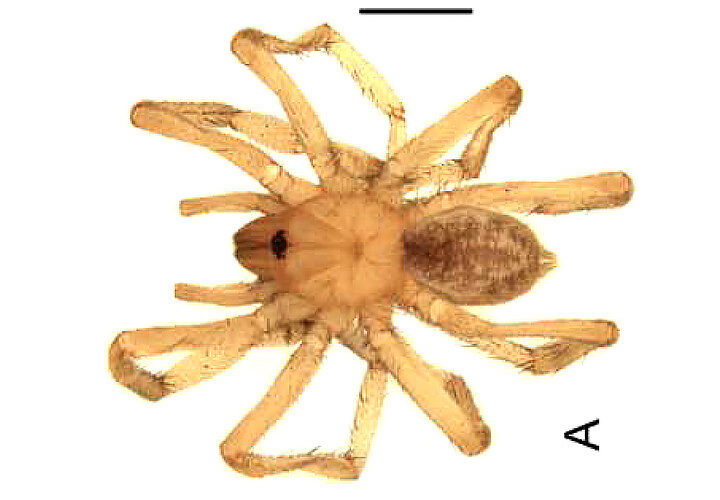Darwin's Big-footed Trapdoor Spider Swolnpes darwini Main & Framenau, 2009
Fauna Portal species: 10568Diagnosis
(after Main & Framenau 2009): Swolnpes darwini males differ from those of S. morganensis by their relatively shorter and less inflated tarsi and metatarsi of leg I, dark pattern on the abdomen (uniformly yellow-brown in S. morganensis) and a basally straight embolus that is terminally pointed (embolus basally curved and less pointed in S. morganensis). Females of neither species are currently known.
Status
- native
Linnean Holotype
Australia
- Western Australia
Fauna Portal Records
The map shows all records that have been verified as part of the Fauna Portal project and may not represent the true distribution of a species. Specifically, for described species, check the link to the Atlas of Living Australia on this page for potential wider distributions. Fauna Portal Reference specimens and Linnean types are shown in red. If you identified a specimen that exceeds the distribution of an undescribed species as illustrated here, please contact the Fauna Portal team who can assist with the lodgement of the specimen in a public institution and display on the map.
Similar Species
Publications
Main BY, Framenau VW (2009): A new genus of mygalomorph spider from the Great Victoria Desert and neighbouring arid country in south-eastern Western Australia (Araneae: Nemesiidae). Records of the Western Australian Museum. 25: 277 - 285WEB
AACAATATATTTGGTGTTTGGAGTGTGGTCTGCAATAGTTGGGACTGCTATAAGAGTAATTGTGCGGACTGAATTGGGACAGGTTGGTAGATTGTTAGGTGATGACCATTTGTATAATGTTATTGTGACGGCTCATGCTTTAGTAATGATTTTTTTTATGGTGATGCCAATTATGATTGGTGGATTTGGGAATTGGTTGGTGCCGTTGATGTTAGGGGCGCCTGACATAGCCTTTCCACGTATAAATAATTTGAGTTTTTGGTTGTTGCCTCCTTCTTTATTTATATTGGTTTTGTCTTCATTTATGGATGTTGGTGTAGGGGCTGGATGGACGGTGTATCCACCCCTATCTTCTGGGGTAGGGCATAGAGGGTGTGGTATGGATTTTGTTATTTTTTCTTTACATTTAGCTGGTGCTTCATCAATTATAGGGGCTATTAATTTTATTTCTACTATTTTAAATATGCGTCCTTGAGGGATGAACATGGAACGAGTTCCTTTATTTGTGTGGTCAGTATTAATTACTGCTATTCTTTTATTGCTTTCTTTACCAGTTTTGGCTGGGGCTGTTACGATGCTTTTAACTGACCGGAATTTTAATACTTCTTTTTTTGATCCTGCTGGTGGTGGAGATCCGATTTTATTTCAGCATTTGTTT
GACAATATATTTGATGTTTGGAGTGTGGTCTGCAATAGTTGGGACTGCTATGAGAGTAATTGTGCGAACTGAATTGGGACAGGTTGGTAGATTGTTAGGTGATGATCATTTGTATAATGTTATTGTGACGGCGCATGCTTTAGTAATGATTTTTTTTATGGTTATGCCAATTATGATTGGTGGATTTGGCAACTGGTTGGTGCCGCTGATGTTGGGGGCGCCTGATATAGCTTTTCCACGTATAAATAATTTGAGTTTTTGGTTGTTGCCTCCTTCTTTGTTTATATTGGTTTTGTCTTCTTTTACGGATGTTGGTGTAGGGGCTGGATGGACGGTGTACCCACCTTTATCTTCTGGGGTGGGGCATAGAGGGTGAGGTATGGATTTTGTTATTTTTTCTTTGCATTTAGCTGGTGCTTCATCGATTATAGGGGCTATCAATTTTATTTCTACTATTTTAAATATGCGTCCTTGAGGGATGAACATGGAACGAGTTCCTTTATTTGTGTGGTCAGTATTGATTACTGCTATTCTTTTATTGCTTTCTTTACCAGTTTTGGCTGGAGCTGTTACGATGCTTTTAACTGATCGGAATTTTAATACTTCTTTTTTTGATCCTGCTGGTGGTGGAGATCCGATTTTATTTCAGCATTTGTTT
Araneae (Spiders)
- Actinopodidae
- Anamidae
- Araneae fam. indet.
- Araneidae
- Archaeidae
- Argyronetidae
- Arkyidae
- Barychelidae
- Cheiracanthiidae
- Clubionidae
- Corinnidae
- Cycloctenidae
- Deinopidae
- Desidae
- Dictynidae
- Filistatidae
- Gnaphosidae
- Halonoproctidae
- Hersiliidae
- Idiopidae
- Lamponidae
- Linyphiidae
- Lycosidae
- Mimetidae
- Miturgidae
- Mysmenidae
- Nicodamidae
- Oecobiidae
- Oonopidae
- Oxyopidae
- Philodromidae
- Pholcidae
- Pisauridae
- Prodidomidae
- Salticidae
- Scytodidae
- Segestriidae
- Selenopidae
- Sparassidae
- Symphytognathidae
- Tetrablemmidae
- Tetragnathidae
- Theridiidae
- Thomisidae
- Trachelidae
- Trachycosmidae
- Trochanteriidae
- Uloboridae
- Zodariidae
- Zoropsidae
All classes
- Arachnida
- Crustacea
- Entognatha
- Gastropoda
- Insecta
- Orthoptera - Caelifera (Grasshoppers)
- Hymenoptera excl. Formicidae (bees and wasps)
- Blattodea s. str. (Cockroaches)
- Coleoptera (Beetles)
- Dermaptera (earwigs)
- Diptera (flies, mosquitos)
- Entomobryomorpha (slender springtails)
- Hemiptera - Heteroptera (True Bugs)
- Hemiptera - Sternorrhyncha (aphids, scales etc.)
- Hemiptera - Auchenorrhyncha (cicadas, planthoppers)
- Hymenoptera - Formicidae (Ants)
- Trichoptera (Caddisflies)
- Zygentoma (silverfish)
- Myriapoda

